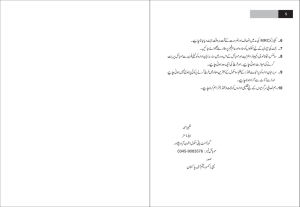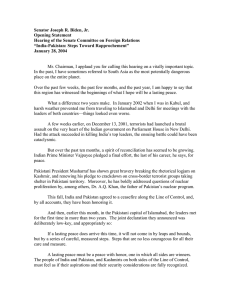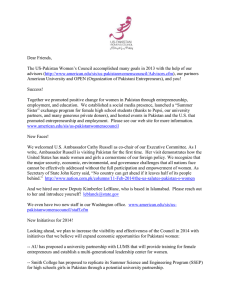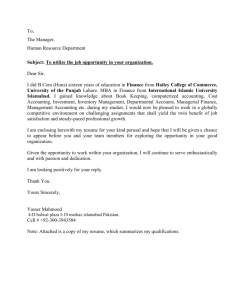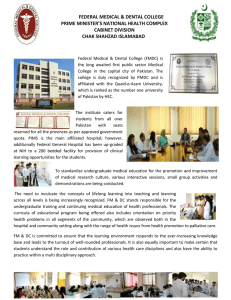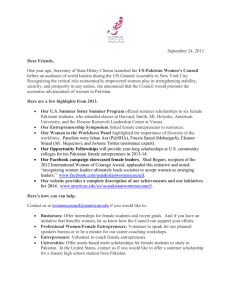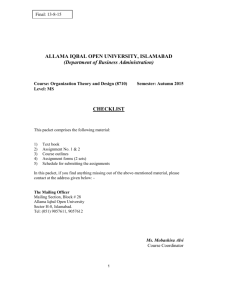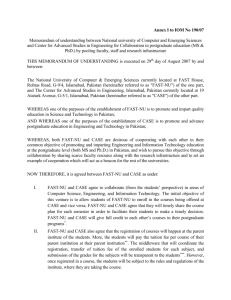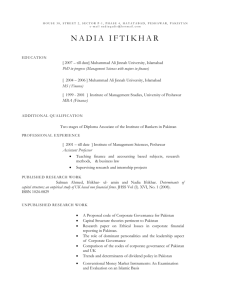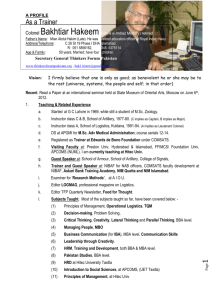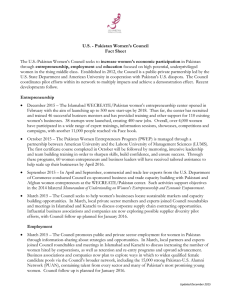That men do not learn very much from the lessons
advertisement
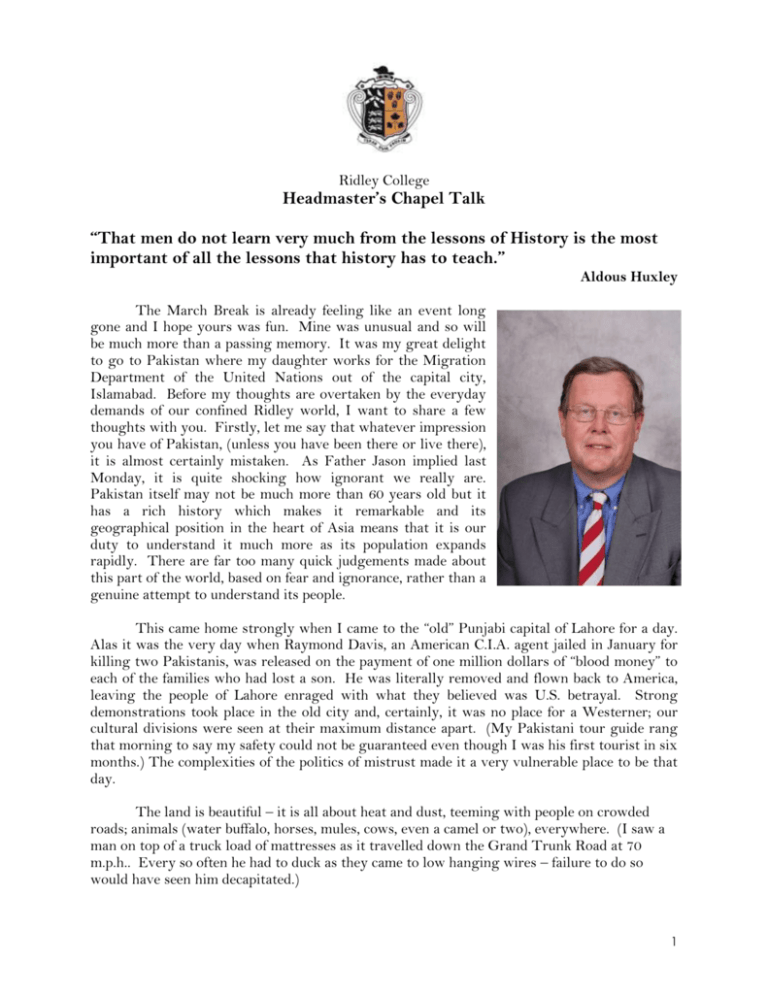
Ridley College Headmaster’s Chapel Talk “That men do not learn very much from the lessons of History is the most important of all the lessons that history has to teach.” Aldous Huxley The March Break is already feeling like an event long gone and I hope yours was fun. Mine was unusual and so will be much more than a passing memory. It was my great delight to go to Pakistan where my daughter works for the Migration Department of the United Nations out of the capital city, Islamabad. Before my thoughts are overtaken by the everyday demands of our confined Ridley world, I want to share a few thoughts with you. Firstly, let me say that whatever impression you have of Pakistan, (unless you have been there or live there), it is almost certainly mistaken. As Father Jason implied last Monday, it is quite shocking how ignorant we really are. Pakistan itself may not be much more than 60 years old but it has a rich history which makes it remarkable and its geographical position in the heart of Asia means that it is our duty to understand it much more as its population expands rapidly. There are far too many quick judgements made about this part of the world, based on fear and ignorance, rather than a genuine attempt to understand its people. This came home strongly when I came to the “old” Punjabi capital of Lahore for a day. Alas it was the very day when Raymond Davis, an American C.I.A. agent jailed in January for killing two Pakistanis, was released on the payment of one million dollars of “blood money” to each of the families who had lost a son. He was literally removed and flown back to America, leaving the people of Lahore enraged with what they believed was U.S. betrayal. Strong demonstrations took place in the old city and, certainly, it was no place for a Westerner; our cultural divisions were seen at their maximum distance apart. (My Pakistani tour guide rang that morning to say my safety could not be guaranteed even though I was his first tourist in six months.) The complexities of the politics of mistrust made it a very vulnerable place to be that day. The land is beautiful – it is all about heat and dust, teeming with people on crowded roads; animals (water buffalo, horses, mules, cows, even a camel or two), everywhere. (I saw a man on top of a truck load of mattresses as it travelled down the Grand Trunk Road at 70 m.p.h.. Every so often he had to duck as they came to low hanging wires – failure to do so would have seen him decapitated.) 1 Men driving donkey carts from a standing position, buses covered in people all over the roof and extremely basic scooters and motorbikes with whole families riding on them; the most I ever saw was six. There is no protective headgear of course and, naturally, no concept of health and safety applies. Amazingly, somehow there is control within all the chaos but it is a hubbub of noise and never ending activity. Another day I found myself talking to a man in my daughter Isabel’s office. This tall, dark, swarthy figure had a strong presence, smart in his white Shalwar kameez, the convenient unisex style of dressing which nearly everyone in her office wore as business attire. I asked him where he came from. He drew himself up, literally puffed out his chest and said with immense pride, “I am a Pathan”. The Pathans are ethnic Pashto speaking people from Northwest Pakistan, an area of forbidding beauty which is part of the Hindu Kush Region. He had been brought up by an uncle in a rural tribal village – his family is still there. Being clever, he went to Islamabad where he got a good degree; now he has a sound job, albeit not earning a lot. He had left his original roots behind and it is now dangerous for him to return to his home tribal area which has been pretty heavily infiltrated by the Taliban. However, this has not diminished his believe in “home”. This was the moving and impressive part of his story. An early cancer victim who has kicked that disease in the face, he believes in giving back to his people, so he sends one third of his relatively meagre salary home each month so that others in the region can get the same opportunity to benefit from education as he has done. How many of us are prepared to contribute in such a meaningful way one might ask? To say that this story was profoundly moving to hear is an understatement. Pakistan’s worries and the disconnect with the Western world would be best tackled through education – books and technology are a better answer than guns….truly the pen is mightier than the sword. Many of you will know of two books by the American visionary Greg Mortenson, the best selling, “Three Cups of Tea” and the sequel to it “From Stones into Schools”. These books account for his work in setting up schools and colleges in (mostly) Pakistan, and, more recently, Afghanistan. In less than 20 years there are more than 200 of them offering that slimmest essential of education – the ability to be literate. Pakistan’s primary education system is bedeviled with being underdeveloped. In world rankings it is the second lowest in the globe. With a population which is still 60% rural, the dangers of it remaining underdeveloped are a real problem. My generation can still help a bit but your generation is confronted with this as a worldwide phenomenon which is far from being just a Pakistani problem. Education is a fundamental human right but it has to be balanced with developing a will to learn and the wish to pass that on. For you who are educated here it is only too easy to take it all for granted; to shrug off the need for continuous learning, the necessity to understand and tolerate others. That is why the lecture which comes to Ridley this coming Monday by Father Raymond De Souza is so important for you to hear and debate…. really it shouldn’t be necessary to have to make such a talk mandatory. Its very title “Religion and Violence; War and Peace – Forces Shaping the 21st Century” should be enough to create curiosity and ensure a large audience… if you have been told to go please do so open-mindedly. Better still, if you are not mandated to go please contemplate doing so – it will teach you a lot and we all have a lot to learn from the endlessly complex world in which we live. We can all ask questions but we do have an obligation to seek answers and not to walk away from the responsibility of being contributing citizens. 2 This brings me back to Pakistan….on my last morning I was sitting on the veranda at my daughter’s house in Islamabad. It was mid-March and 30 degrees. The outlook towards the forty million year old Margalla Hills, the foothills of the Himalayas, “the roof of the world”, is beautiful. Reflecting on my all too rapid experience of this ever-changing landscape where life is so very different from our own existence here and, indeed, life expectancy is very little, I found myself reflecting on the irony of the beauty of the hills with the circling birds of prey enjoying the thermal pressures in an endless fantailed flight. These hills had witnessed the birth of a new city in 1961 – Islamabad – the abode of Islam. More than that they have witnessed thousands of generations of conquest and strife, war and peace, religion and violence, the very forces which continue to shape our existence. “That men do not learn very much from the lessons of history is the most important lesson that history has to teach” (Aldous Huxley). History has a nasty habit of repeating itself but every so often a visionary appears who can alter it forever. The problems coming from this corner of the world where there is so much misunderstanding need to be addressed. Remember, Ridleians, that any one of you could have a profound impact on this world but do learn from your education – truly, the pen is mightier than the sword…you can all make a difference if you have an open mind. Jonathan Leigh, Headmaster. April 8, 2011 3

